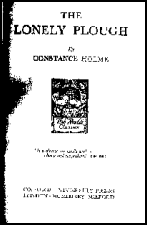

PREFACE
to the 1930 Edition
When
this novel was published in May 1914, the following summary of it appeared on the cover:
'The Lonely Plough is the story of a landed estate, and
of a big flood on a northern marsh, bringing out the loyalty of the
north-country character, not only to the living but to the dead. It endeavours
to show the value of the three-cornered relationship between landlord, agent and
tenant, when each is an honest man, living to
his standard, and having confidence in the others. Especially it points out the
difficult position of the steward, the responsibility resting upon him, and of
the many qualifications he is expected to possess.’
This
was written at almost the last moment of the old order of things, and it is
perhaps of some slight interest to note how far it applies today. Times have
altered, of course, and it is impossible to foresee how they may continue to
alter. Many estates have been broken up either wholly or in part; electricity
and the motor-bus have changed the conditions of the countryside; farmers' sons
are restless, turning away from the call of the land to the call of the
engineering spirit of the age; the land itself sometimes seems to be
disappearing under the wave of building sweeping across it.
Yet
much remains. Property, as yet, remains; requiring, in view of the new problems
confronting both landlord and tenant, `stewards' more sound and sensible than
ever. Old customs have obstinately re-established themselves, as if war were the
mere gesture of a day, and they the things eternal. And at present the land
remains, and while it exists it will always make and manage its own children.
Man is subdued to what he works in, and no bungalow-dweller tending a garden but
is being captured by the soil. The pull of the land, like the pull of the sea,
is in our blood, and any townsman may hear it. Our own lads may wander but somebody else's will come back.
And
the need for loyalty remains - for honesty and straight dealing and confidence
in our fellows. The land teaches these virtues, for it will be satisfied with
nothing less. `Be honest with the
land', say the farmers, `and it will be honest with you'-and while we have land
we shall have the lesson. These necessities are fundamental and do not alter. The Lonely Plough is the story of more than one honest
man; and honest men, please God, will never be out of date'.
Westmorland,
1931.